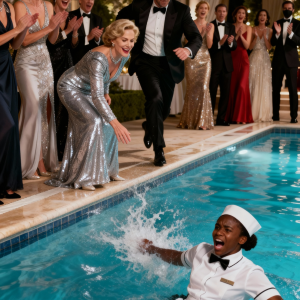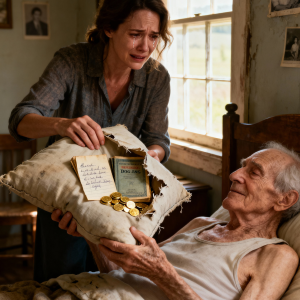
No house in Silverwood had ever endured Madame Helena Wainwright. Behind the tall iron gates and sprawling gardens, the mansion gleamed in the sunlight, but inside it was a battlefield. In just a few months, seven housekeepers had quit, some in tears, one running barefoot across the back lawn under the moonlight.
Clara Donovan arrived with only a small leather bag slung over her shoulder. In her early thirties, she had seen more pain than most people could imagine. Her young daughter, Lila, was eight and struggling with a serious heart condition. Bills were mounting, and this job was her only chance to keep her family afloat.
On her first morning, she tied her hair back and began polishing the marble floors. The scrape of her brush was interrupted by sharp footsteps echoing down the staircase. Madame Helena appeared, silk robe clinging to her figure, her eyes cold as winter. She looked at Clara and without a word tipped over the bucket of water.
“This is the third time the hallway has been blocked,” Helena said, her voice sharp. “Start over.”
Clara swallowed her pride and bent down to mop again. From the kitchen doorway, the house chef, Mrs. Whitmore, whispered, “She will not last.” Clara ignored her. She had faced fear in hospital corridors, pleading for her daughter’s life. She was not fragile. She was quiet steel.
The following day, she was up before dawn, sweeping the driveway and polishing the glass doors. When Helena demanded lemon water served precisely, Clara carefully prepared the tray and delivered it. Helena tasted it and smirked, saying, “You got it right. Consider yourself lucky.” Then she noticed a small smear on the sink. “Stains make me furious,” she hissed. Clara wiped it clean without argument. Helena even knocked over a perfume bottle and slapped Clara when she caught it.
“You are clumsy,” Helena spat.
Clara bowed her head. “I am sorry, Madam.”

In the hallway, Mr. Julian Wainwright, the mansion’s owner, watched silently. His eyes softened as he observed Clara’s calm. Her endurance unsettled him, though he did not intervene.
By the third day, the staff began to notice. Clara had not cried, had not shouted, had not fled. She worked steadily, calmly, and with quiet determination. Helena escalated her tests. First, Clara’s uniforms disappeared, replaced with an unfamiliar nightgown. Helena mocked her in front of the staff. Clara simply returned to her chores in a worn blouse and skirt.
“Did you sleep in the gutter or dress for the floor?” Helena sneered.
Clara lowered her eyes and continued her work.
Then came staged accidents. Red wine spilled on the carpet, crystal bowls toppled, trays upset. Clara cleaned everything quietly, apologizing softly each time, not for guilt but survival.
One evening, Mr. Wainwright approached her in the garden. “Clara, are they treating you fairly?”
Clara looked up, exhausted but composed. “Life has taught me endurance. I will be fine.”
Her words lingered with him. When he asked Helena why Clara remained, she answered, “She is useful. Nothing more.” Even Helena felt something shift. Clara’s steady dignity unsettled her power.
On a rainy afternoon, Clara saw Helena sitting alone in the library, robe damp, mascara streaked. Vulnerable. Clara placed a folded towel nearby.
“Why do you stay?” Helena asked, voice trembling.
“For my daughter,” Clara said firmly. “She is sick, and this work allows me to care for her.”
Helena stared. “You are not afraid of me?”
“I once feared everything,” Clara said softly. “But when you have faced losing someone you love, nothing else can break you.”
From that day, the house changed. Harsh words softened, hallways quieted, and the staff whispered in amazement. Helena even sent Clara an envelope with money to visit Lila. Clara rushed to the hospital and found her daughter smiling weakly. “Mommy, you came,” Lila whispered.

Helena’s heart began to change. She remembered her own humiliations and realized Clara’s patience showed her strength need not be cruel. Weeks later, Clara attended a charitable luncheon with Helena’s encouragement, introduced not as a servant but as a devoted mother. There, a doctor offered to cover all of Lila’s treatments. Clara fell to her knees in the kitchen, tears streaming, as the staff celebrated with her.
The operation succeeded. When Clara returned home with Lila, the mansion welcomed them with laughter, decorations, and food. Helena knelt to present a storybook, whispering, “Call me Aunt Helena.” Shortly after, Clara was promoted, given her own quarters, better pay, and medical support for Lila.
“You did not just clean this house,” Helena said softly. “You cleaned the fear out of it.”
From that day, Clara became the heart of the Wainwright mansion. Laughter replaced slammed doors. Respect replaced fear. In surviving, she had healed not just her daughter but an entire home.



